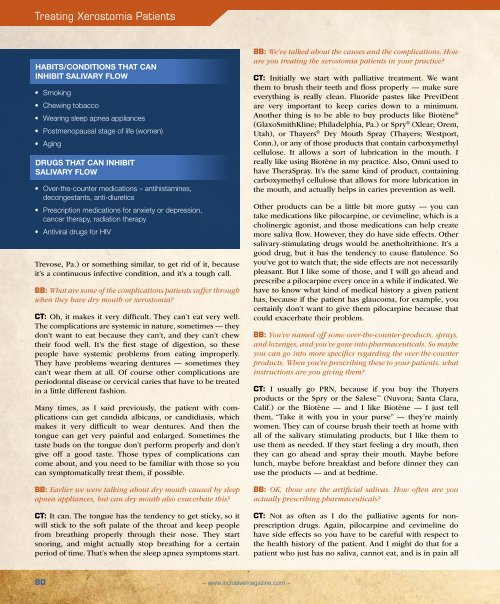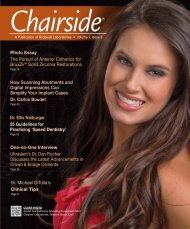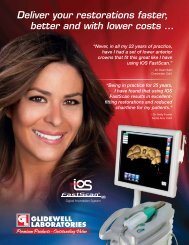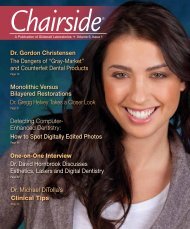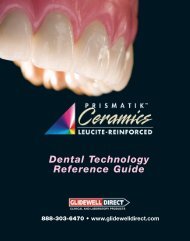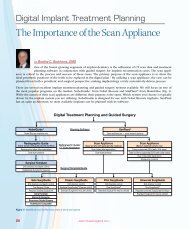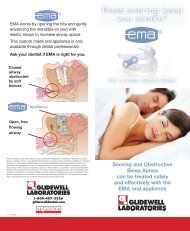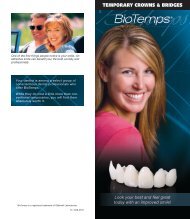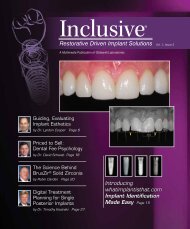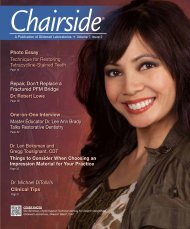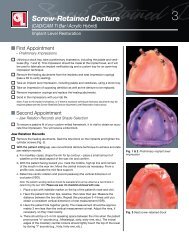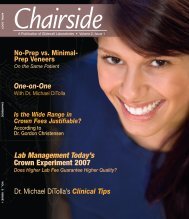PDF Download - Glidewell Dental Labs
PDF Download - Glidewell Dental Labs
PDF Download - Glidewell Dental Labs
You also want an ePaper? Increase the reach of your titles
YUMPU automatically turns print PDFs into web optimized ePapers that Google loves.
Treating Xerostomia Patients<br />
HABITS/CONDITIONS that can<br />
INHIBIT salivary flow<br />
• Smoking<br />
• Chewing tobacco<br />
• Wearing sleep apnea appliances<br />
• Postmenopausal stage of life (women)<br />
• Aging<br />
DRUGS THAT CAN INHIBIT<br />
SALIVARY FLOW<br />
• Over-the-counter medications – antihistamines,<br />
decongestants, anti-diuretics<br />
• Prescription medications for anxiety or depression,<br />
cancer therapy, radiation therapy<br />
• Antiviral drugs for HIV<br />
Trevose, Pa.) or something similar, to get rid of it, because<br />
it’s a continuous infective condition, and it’s a tough call.<br />
BB: What are some of the complications patients suffer through<br />
when they have dry mouth or xerostomia?<br />
CT: Oh, it makes it very difficult. They can’t eat very well.<br />
The complications are systemic in nature, sometimes — they<br />
don’t want to eat because they can’t, and they can’t chew<br />
their food well. It’s the first stage of digestion, so these<br />
people have systemic problems from eating improperly.<br />
They have problems wearing dentures — sometimes they<br />
can’t wear them at all. Of course other complications are<br />
periodontal disease or cervical caries that have to be treated<br />
in a little different fashion.<br />
Many times, as I said previously, the patient with complications<br />
can get candida albicans, or candidiasis, which<br />
makes it very difficult to wear dentures. And then the<br />
tongue can get very painful and enlarged. Sometimes the<br />
taste buds on the tongue don’t perform properly and don’t<br />
give off a good taste. Those types of complications can<br />
come about, and you need to be familiar with those so you<br />
can symptomatically treat them, if possible.<br />
BB: Earlier we were talking about dry mouth caused by sleep<br />
apnea appliances, but can dry mouth also exacerbate this?<br />
CT: It can. The tongue has the tendency to get sticky, so it<br />
will stick to the soft palate of the throat and keep people<br />
from breathing properly through their nose. They start<br />
snoring, and might actually stop breathing for a certain<br />
period of time. That’s when the sleep apnea symptoms start.<br />
BB: We’ve talked about the causes and the complications. How<br />
are you treating the xerostomia patients in your practice?<br />
CT: Initially we start with palliative treatment. We want<br />
them to brush their teeth and floss properly — make sure<br />
everything is really clean. Fluoride pastes like PreviDent<br />
are very important to keep caries down to a minimum.<br />
Another thing is to be able to buy products like Biotène ®<br />
(GlaxoSmithKline; Philadelphia, Pa.) or Spry ® (Xlear; Orem,<br />
Utah), or Thayers ® Dry Mouth Spray (Thayers; Westport,<br />
Conn.), or any of those products that contain carboxymethyl<br />
cellulose. It allows a sort of lubrication in the mouth. I<br />
really like using Biotène in my practice. Also, Omni used to<br />
have TheraSpray. It’s the same kind of product, containing<br />
carboxymethyl cellulose that allows for more lubrication in<br />
the mouth, and actually helps in caries prevention as well.<br />
Other products can be a little bit more gutsy — you can<br />
take medications like pilocarpine, or cevimeline, which is a<br />
cholinergic agonist, and those medications can help create<br />
more saliva flow. However, they do have side effects. Other<br />
salivary-stimulating drugs would be anetholtrithione. It’s a<br />
good drug, but it has the tendency to cause flatulence. So<br />
you’ve got to watch that; the side effects are not necessarily<br />
pleasant. But I like some of those, and I will go ahead and<br />
prescribe a pilocarpine every once in a while if indicated. We<br />
have to know what kind of medical history a given patient<br />
has, because if the patient has glaucoma, for example, you<br />
certainly don’t want to give them pilocarpine because that<br />
could exacerbate their problem.<br />
BB: You’ve named off some over-the-counter-products, sprays,<br />
and lozenges, and you’ve gone into pharmaceuticals. So maybe<br />
you can go into more specifics regarding the over-the-counter<br />
products. When you’re prescribing these to your patients, what<br />
instructions are you giving them?<br />
CT: I usually go PRN, because if you buy the Thayers<br />
products or the Spry or the Salese (Nuvora; Santa Clara,<br />
Calif.) or the Biotène — and I like Biotène — I just tell<br />
them, “Take it with you in your purse” — they’re mainly<br />
women. They can of course brush their teeth at home with<br />
all of the salivary stimulating products, but I like them to<br />
use them as needed. If they start feeling a dry mouth, then<br />
they can go ahead and spray their mouth. Maybe before<br />
lunch, maybe before breakfast and before dinner they can<br />
use the products — and at bedtime.<br />
BB: OK, those are the artificial salivas. How often are you<br />
actually prescribing pharmaceuticals?<br />
CT: Not as often as I do the palliative agents for nonprescription<br />
drugs. Again, pilocarpine and cevimeline do<br />
have side effects so you have to be careful with respect to<br />
the health history of the patient. And I might do that for a<br />
patient who just has no saliva, cannot eat, and is in pain all<br />
80<br />
– www.inclusivemagazine.com –


